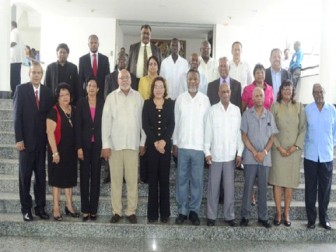A diaspora unit has been established in the Ministry of Foreign Affairs and President Donald Ramotar has urged Guyana’s diplomats to tap into the resources, skills and influence of Guyanese overseas to assist in the development of the country.
“You… have to stay engaged with our diaspora,” Ramotar told the heads of Guyana’s missions and other Foreign Service officials at the opening of the Heads of Mission conference at the International Conference Centre, at Liliendaal yesterday. The diplomats are meeting to discuss the outcomes and directions of national interest being articulated in foreign countries, capitals and Guyana’s contributions to international relations.
Minister of Foreign Affairs Carolyn Rodrigues-Birkett had listed the establishment of a diaspora unit as one of the developments since the last heads of mission conference in 2009.

Ramotar pointed out that many of the diplomats work in countries where there is a sizeable population of Guyanese and urged them to tap into the diaspora to help in the development of Guyana. He said this can be not only in the form of direct investments and skills but many are in important positions and can bring new perspectives and best practices that can help in the development of the society. He said the diplomats are the first point of contact with these persons and must be open to the ideas.
The President also emphasised the importance of the image of the country. He urged the diplomats to be conscious of this image and stressed that it has grown in importance in recent times “largely because of what’s taking place domestically as well.” Ramotar said that while he respects freedom of the press and the role that media plays in development, sections of the press seem to be on a crusade to paint “every single important project” in a negative light and to taint it with the brush of corruption.
According to the President, while he suspects that the development is politically-motivated, it can also have an impact on Guyana’s international relations. He said that the diplomats have to ensure that the image of the country is not damaged because it can affect the country’s economic well-being. He pointed out that Guyana does not have all the resources to have all the investments that will be needed to develop the country and there is a need to attract investment from abroad. It must be ensured that the “true picture of our country is well known abroad that we are…reliable partners, we take our decisions seriously, we hold up to our commitments and we are open to do business with the rest of the world,” Ramotar said.
He said that Guyana’s image should also be one of a country that is efficient and much can be learned from nationals that live in various parts of the world. He also urged the diplomats to “popularise” what Guyana can offer internationally and noted that Guyana is a leader in the fight against climate change and can make an impact.
‘New partners’
Meanwhile, Rodrigues-Birkett, in listing the achievements since the last meeting of mission heads in 2009, said that it is important that Heads of Mission reorient themselves with Guyana’s domestic developments and discuss the developments and future plans in terms of foreign relations.
She noted that Guyana has benefited from collaboration with the Caribbean Com-munity (Caricom) in the coordination of the grouping’s foreign policy. She said that more and more, Heads of Mission will be required to coordinate with their Caricom counterparts.
The minister said that while the US remains Guyana’s largest trading partner, the diversification of power enveloping the world must also be recognised. She said that the Cariforum-EU Economic Partnership Agreement has so far not brought any increase in trade with Europe. “It is therefore imperative that as we consolidate our relations with traditional partners we must also seek to build new ones. As part of this dispensation we will be establishing a mission in South Africa some time next year even as we seek to have joint representation here and in other parts of the world,” the minister said.
Earlier, the President had noted that foreign policy is a continuation of domestic policy and the diplomats reflect the relations that Guyana wants to display internationally. “Clearly therefore you must be plugged in to what is happening at home. You must know everything that is taking place and you should be asking questions when you do not have all the information,” he said. Ramotar said that the diplomats must be aware of the government’s plans to develop Guyana. He also noted that they have to be aware of what is happening internationally to assess its impact on the country. The President also said that the diplomats have to understand what is taking place in the society and how they can move things along.
Ramotar said that while the country has to continue to build and expand the historical relationship with the northern countries, North America and Europe in particular, he also pointed to the rising importance and economic clout of southern countries such as Brazil. “We have to expand and broaden our relationships with the south” as this makes good sense, he said.
Ramotar said that security is another important area and cooperation with other countries is needed to combat the drug trade.
He also said that Guyana’s relationship with South America is growing and more diplomats have to be trained and they need to be multilingual as well. Further, Ramotar restated the idea of Caricom countries sharing the cost of diplomatic services in different parts of the world. He said that it is very expensive to run a diplomatic post and the idea of sharing the cost makes “makes such eminent sense” and he does not know why Caricom countries are not doing it but it is only a matter of time before its values are known.




